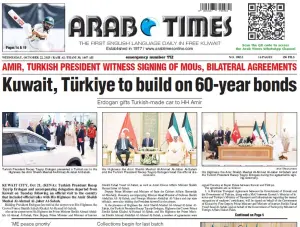13/07/2025
13/07/2025
VIENNA hosted the first International Jewish Anti-Zionist Conference from June 13 to June 15 in the same city where Theodor Herzl convened the first Zionist Congress in 1897. Despite its significance as a historic and exceptional event, the conference received minimal media attention, except for a notable piece written by Palestinian activist Dr. Mustafa Barghouthi, from which I quote the following: The conference, attended by 500 participants, was titled “The Jewish Anti- Zionist Conference” and brought together prominent Jewish and Palestinian figures. It was sponsored by the Austrian organization “Democracy and Human Rights in Palestine”, known for its anti-Zionist and anti-imperialist stance.
The organization sees itself as part of the global liberation movement and is led by Jewish and Austrian activists in coordination with independent Palestinian figures. Several pro-Palestine Jewish networks took part, including “European Jews for Palestine”, “Jews for Justice for Palestinians”, “Jewish Voice for Peace”, “European Jews for Peace”, and the “International Jewish Anti- Zionist Network”. The conference aimed to reject Zionism as a racist and colonialist ideology and to challenge the conflation of criticism of Israel with anti-Semitism. The conference aimed to build a global Jewish front to resist colonialism and apartheid, acknowledge the Palestinian Nakba, and work toward ending it by supporting the Palestinian right of return and dismantling the Zionist regime. The final statement, written in bold and revolutionary language, firmly rejected Zionism, not only as a colonialist ideology but also as a racist regime that must be entirely dismantled.
Some viewed the conference as a historic turning point in the Palestinian struggle against Zionism and a step toward breaking Zionism’s monopoly on representing the Jewish people. It gave the Palestinian cause a new level of legitimacy in Europe, this time voiced by Jewish participants, which could mark the beginning of the end of Zionist blackmail of the West. By forging a Palestinian–Jewish alliance against Zionism, the conference moved beyond the traditional narrative of a “conflict between two peoples,” posing a direct challenge to the Zionist discourse. The conference brought together prominent Jewish academics, activists, and intellectuals from around the world. Holocaust survivor Steven Kappus declared that Israel commits atrocities in the name of Holocaust victims, stating, “Whoever lived through the Nazi hell cannot remain silent about what Israel is doing today in Gaza.”
Other participants described Israel as a colonial apartheid regime, similar to the former apartheid system in South Africa. The event sparked huge controversy. Some critics accused it of distorting the memory of the Holocaust, particularly through its invocation of the “Mauthausen Oath”, in which Holocaust survivors pledged to fight fascism. Some claimed the oath was being weaponized against Israel and intertwined with conspiracy theories and antisemitic rhetoric. The conference also called for the liberation of “Palestine from the river to the sea”, rejecting the two-state solution as a façade for ongoing colonialism. Participants demanded that Israel and its leaders be held accountable before the International Criminal Court and advocated for expanding the definition of crimes against humanity to include settlement expansion and the blockade of Gaza.
By Ahmad alsarraf
e-mail: [email protected]



